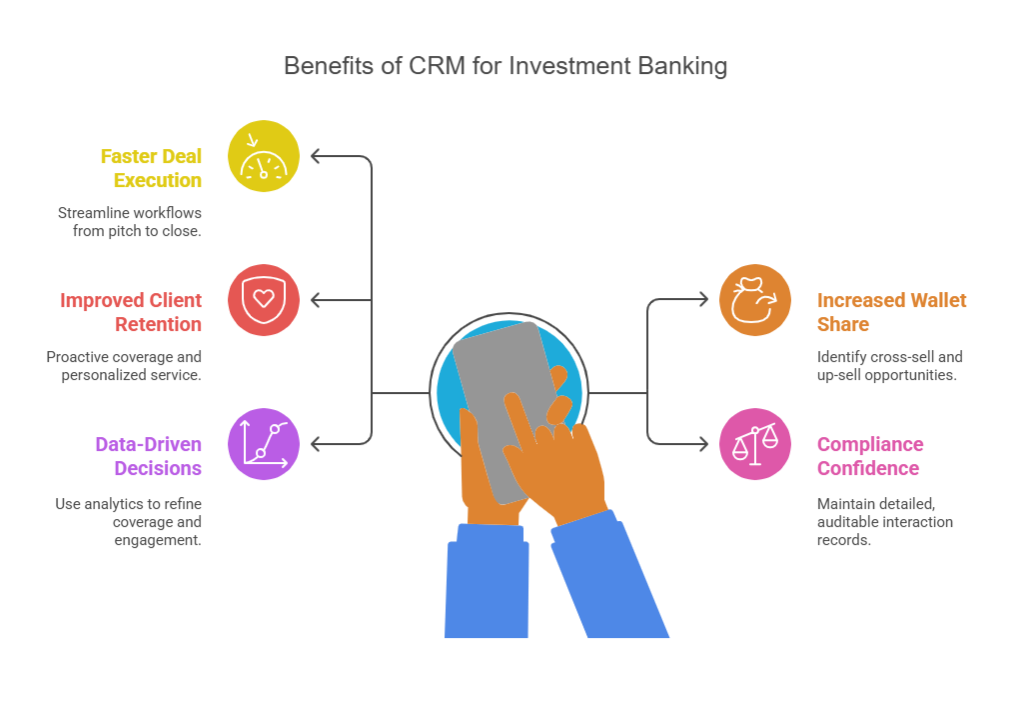CRM Strategies for Investment Bankers: Managing Institutional Relationships at Scale

CRM strategies for investment bankers are essential in 2025 as the investment banking industry becomes more competitive and dynamic than ever before. Investment banks must manage complex client relationships while adapting to rapid market changes and increasing customer and regulatory demands. With high-value clients expecting personalized, real-time solutions, the pressure to deliver exceptional service while closing high-stakes deals is greater than ever.
In this difficult situation, conventional technologies such as Excel spreadsheets and generic Customer Relationship Management (CRM) platforms are not meeting the needs. They are unable to meet the needs of contemporary investment banking, which results in missed opportunities, data silos, and inefficiencies.
More complex solutions, like contemporary financial services or investment banking-specific CRM, are needed to manage enormous volumes of data, cultivate client relationships, and coordinate across teams. These solutions go far beyond a digital Rolodex that merely keeps contact details or a document management system.
CRM solutions for investment banking have become crucial for banks trying to outperform their competitors. In addition to offering deep insights and sophisticated analytics about customer interactions and market trends, these systems have capabilities that improve collaboration and expedite procedures.
The key to success in investment banking is relationship management. Whether it’s nurturing relationships with corporate clients, institutional investors, or private equity partners, the ability to track, engage, and grow relationships at scale defines a bank's competitive edge.
This is why modern CRM strategies are no longer optional—they’re essential.
Investment bankers today need more than contact databases or call logs. They require a holistic CRM strategy that integrates client intelligence, deal flow management, compliance tracking, and cross-team collaboration. In this article, we’ll explore how to build CRM strategies tailored to investment banking and why adopting a specialized investment banking CRM is key to managing institutional relationships effectively.

What is Investment Banking CRM?
CRM in investment banking refers to a customer relationship management system designed specifically for the unique demands of financial institutions. It supports banks in managing client relationships, monitoring deals, and improving communication facilitating personalized services, streamlined operations, and stronger client engagement essential in high-stakes financial settings.
Why CRM Matters in Investment Banking
Relationship management in investment banking is fundamentally different from traditional B2B sales. It’s not about closing one-off transactions—it’s about:
- Managing multi-year client relationships
- Tracking mandates, pitches, and deal engagements
- Coordinating between coverage bankers, product teams, and compliance
- Maintaining detailed records for regulatory purposes
That’s where CRM in the banking sector comes in. A well-executed CRM strategy enables banks to systematize relationship-building while staying agile and client-focused.
Challenges of Relationship Management in Investment Banking
Investment bankers face unique challenges that require specialized CRM strategies:
1. Complex Client Structures
Institutional clients often have multiple points of contact, including:
- CEOs, CFOs, and Treasurers
- Investor Relations teams
- Fund managers and trading desks
- Legal and compliance teams
Tracking these relationships requires a CRM system that can map complex hierarchies.
2. Multi-Product Coverage
Clients engage with different banking services such as:
- M&A advisory
- Debt Capital Markets (DCM)
- Equity Capital Markets (ECM)
- Structured Finance
An investment banking CRM needs to track cross-product interactions seamlessly.
3. Compliance and Regulatory Demands
Bankers must document client communications for:
- MiFID II and SEC compliance
- Anti-money laundering (AML) requirements
- Internal audit readiness
CRM tools must automatically log interactions, minimize manual effort while ensuring compliance.
4. Deal Pipeline Visibility
Managing deal pipelines is not just about tracking stages it’s about:
- Coordinating with syndicate desks
- Monitoring competitive landscapes
- Tracking pitch success rates
- Managing post-deal engagement
CRM systems must integrate deal flow management with relationship tracking.
Building CRM Strategies for Investment Bankers
To manage institutional relationships at scale, CRM strategies for investment banks must address the specific dynamics of their business.
Here’s how to structure an effective CRM strategy:
1. Centralize Relationship Data
Unify all client interactions in a single CRM for investment banking, including:
- Meeting notes
- Call logs
- Emails and Bloomberg chats
- Deal history and pipeline status
- Research distribution and consumption data
This gives the customer relationship a 360-degree perspective.
2. Customize CRM Workflows
Investment banking is not a one-size-fits-all business. Your CRM strategy should include:
- Custom deal stages (e.g., Pitch → Mandate → Execution → Post-Deal Review)
- Sector-specific coverage tracking
- Multi-party contact management for buy-side and sell-side interactions
- Automated alerts for deal updates and client follow-ups
3. Leverage CRM Analytics
Use CRM analytics to gain insights such as:
- Relationship strength scores
- Client engagement trends
- Coverage frequency and service intensity
- Deal conversion rates
These insights help prioritize high-value clients and fine-tune relationship management strategies.
4. Integrate Compliance and Security
Ensure your investment banking CRM supports:
- Interaction logging with time stamps
- Permissioned access based on role and region
- Secure data storage aligned with GDPR, FINRA, or SEC guidelines
- Automated compliance reporting
This reduces risk and builds trust with both regulators and clients.
5. Enhance Collaboration Across Teams
Break down silos between:
- Coverage bankers
- Product specialists
- Syndicate and capital markets teams
A unified CRM in the banking sector enables shared intelligence, ensuring that the entire bank presents a coordinated front to its clients.
Benefits of CRM for Investment Banking
By adopting a tailored CRM strategy, investment banks can:

How InsightsCRM Powers CRM in the Banking Sector
InsightsCRM is designed specifically for investment banks and capital markets firms. Unlike generic CRMs, it offers:
- Multi-level relationship mapping (firm, contact, role, influence)
- Integrated deal pipeline and mandate tracking
- Compliance-ready communication logging
- Syndicate and corporate access management
- Real-time dashboards for banker productivity and client engagement
With InsightsCRM, investment banks gain a scalable system for managing both relationships and revenue.
The Future of CRM Strategies in Investment Banking
In the future, CRM for investment banking will keep developing with:
- AI-powered relationship insights
- Automated meeting summaries with sentiment analysis
- Predictive client needs forecasting
Firms that embrace these technologies will outperform those stuck in manual, fragmented systems.
Final Thoughts: CRM Strategies Are Key to Institutional Growth
In the relationship-driven world of investment banking, managing institutional connections at scale is no easy task. However, with the right CRM strategies, banks can transform their client management from reactive to proactive, thereby building trust, securing mandates, and staying ahead of their competitors.
A modern investment banking CRM, such as InsightsCRM, empowers bankers to deliver personalized service at scale while ensuring compliance and enhancing profitability.
Take Control of Your Institutional Relationships with InsightsCRM
Looking to optimize your CRM strategy for investment banking?
InsightsCRM helps you manage relationships, pipelines, and compliance in one unified platform, designed for the banking sector.
